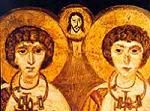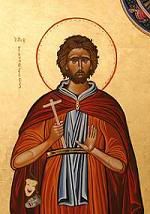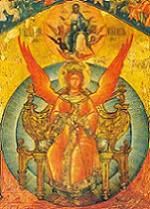An excellent rite for the Elevation of the Deceased, by my good friend and colleague the Rev. Dn. Michael Strojan
Facebook
-
Join 128 other subscribers
In memory of:
Leelah Alcorn, Jamey Rodemeyer, Jamie Hubley, Dominic Crouch, Tyler Clementi, Seth Walsh, Asher Brown, Billy Lucas, Raymond Chase, Larry King, Shelley “Treasure” Hilliard, Marcellus Richard Andrews, Matt Epling, Cody J. Barker, Caleb Nolt, Bill Clayton, Eric James Borges, Phillip Parker, Rafael Morelos, Mahmoud Asgari and Ayaz Marhoni, and all those who have been killed or pushed to suicide for being who God made them to be. May they rest in peace.Blogroll
Meta
Patrons

Holy Sergius & Bacchus

Holy Genesius

Holy Anthony of Padua

Holy Prophet Mani

Holy Archangel Michael
-
Recent Posts
Archives
- May 2020
- October 2019
- December 2017
- November 2015
- October 2015
- August 2015
- February 2015
- December 2014
- November 2014
- October 2014
- September 2014
- August 2014
- April 2014
- January 2014
- December 2013
- July 2013
- January 2013
- December 2012
- November 2012
- February 2012
- January 2012
- December 2011
- November 2011
Categories
- 12 Days adam Advent advent candles advent wreath angels apple archangels blessing book of hours breviary candles chaplets christ Christmas commemorations compline confraternity departed souls Descent of Sophia devotion divine office Easter emanations Epiphany Esclarmonde ethics eve evening prayer feast days gloria gnosis gnostic's prayer god hail sophia hallowtide Hermes Trismegistus hermetic hoodoo John the Apostle little office Magnificat martyrs morals morning prayer mysteries novena O Antiphons O Come Emmanuel OSE prayer prayers prayers for the dead prime psalms requiem ritual rosary saints Sapientia serpent seven sorrows sign of the cross sin Sophia sorrowful mother St. John's Day St. Michael thoughts tree of knowledge trinity Twelve Days of Christmas vigil wine Wisdom
Patrons

Most Holy Sophia

Holy Pier-Giorgio Frassati

Holy Thomas the Apostle
Gnostic Devotions · Online Book of Christian Gnostic devotions

The first thing linked to is silly garbage. It is an affront to the Holy Spirit.
Agnosticism on the soul after death does not a Gnostic make.
Your church is no church: it is fraternal occultism in essence, with a thin Catholic veneer. You have no grace and you raise no saints.
Occultism is darkness and spiritual poison. Avoid it. Have nothing to do with it and get further away from those who embrace it.
Paganism is false and man-made religion. Like the modern Gnostic movement.
I am agnostic about one thing: whether I will end up using your Little Office at all.
Honestly Andrew, I have no idea how to respond. I didn’t see anything wrong with his ritual… But for me, it’s a religious obligation to care for the departed — something that I think has been largely lost in our society. That’s why I shared this. I’m not sure how much of this was directed at me, and how much was directed at Michael, since you also dragged my book into it. But I would appreciate it if you didn’t make assumptions about my church, nor my friend’s, based on personal rituals and prayers we compose on our respective blogs. If there’s something you don’t understand, questions are always welcome — but your comments seem to be an attack based on misunderstanding.
The faithless wolf in sheep’s clothing, Strojan, is more who I am criticizing, but you are wrong to enable him. Like the church of Laodicea in Revelations, you have the shallow “love” that embraces all falsehoods. But of course none of you will ever listen to me, because you are not Christians of any kind, but self-willed neopagans. Have fun with that Tarot deck.
I have done much intensive research of ancient Gnosticism as well as the modern hooligans who appropriate the mantle by that name. I have given modern “Gnostic Christianity” every benefit of the doubt to be truly Gnostic whilst being truly Christian. It fails.
Until I can attain to being a good and effective simple Christian, it is moot, vain and proud to strive to be a Gnostic one.
Hi there Andrew! I’m glad that you’re a fan of Bro. Pier-Giorgio’s blog and had so many wonderful things to say about my entry. 🙂 I’m especially flattered that you compared the calibre of my meager work to early community in Laodicea, the same town where Timothy (one of my favorite evangelists) composed his famous epistle. As a matter of course, I wrote the above ritual to help me better grasp the beauty of God’s Creation in its diversity and to help enable people to connect to those they hold dear in their hearts and minds. I would heartily suggest you give it as well as the Little Office of the Sophia a try. They’re both fascinating devotions. If you’d like, I can give you a tarot reading to help discern which you may wish to do first.
Peace Profound.
Of course all religions are man made. They are sets of doctrine, ritual, and dogma, designed to keep us from actually experience the wonder and glory of God. Lucky God in Her Wisdom gave us an innate drive towards spirituality.
(Sorry hit post by accident let me finish that.)
Spirituality, is what draws us closer to God. Religion more often drives a wedge between peoples actual understanding of God and Her Wisdom, placing restrictions on peoples understanding of Her. Saying that it MUST BE THIS WAY, NO OTHER.
God, in Her Glory, encompasses all things, and is all things, She can not be restrained by the dogma that we apply to Her. We are the fish that is in Her the ocean.
See, I don’t go in for the distinction between spirituality and religion. I understand what people mean by that, I just think that the word “religion” is being misused and/or misunderstood. Etymologically, it comes from the Latin “religare”, which means to reconnect, relink, or bind fast. In that sense, I have no problem calling myself religious, because that’s what I’m trying to do — connect with God and return to Him.
I would argue that ritual (with some possible exceptions) is designed to help us experience the wonder and glory of God. Dogma… well, that’s a whole different issue. 😉
However, language evolves and isn’t really connected, and religion is really connected with it’s original meaning(s) anymore. The metaphor of it has changed.
I don’t know, from my own experience, that connotation only seems to have arisen within my lifetime… So it’s not old enough for me to accept as a new meaning. “Dogmatism” seems a lot more descriptive. I also find that with a lot of people who identify as “spiritual but not religious”, they often make things up as they go along, and completely miss out on the over all experience of group worship and the power that goes along with worshiping with a group. Religion doesn’t have to be dogmatic, unfortunately that’s the way it’s become in Judaism, Islam, and Christianity.
The only people who seem to use the word religion as you describe it are those who believe that Religion = Christianity (which is a relatively modern phenomenon). Most religions of the world and history do not have dogma as you describe it, and so I’m with Bro. Pier-Giorgio here in my understanding of religion in general as means by which people tend to connect with their respective Gods. Religion is tradition, it’s rituals, it’s myth and stories, all of which serve to connect people with the Gods.
“Religion doesn’t have to be dogmatic, unfortunately that’s the way it’s become in Judaism, Islam, and Christianity.”
I would say ‘In some forms of Judaism, Islam, and Christianity’. Not every form has totally bought into Dogmatism, though they have dogmas.
That is true, our forms certainly aren’t dogmatic. 😉
Jay, can you name a religion that doesn’t have dogma? With dogma meaning: “an official system of principles or tenets concerning faith, morals, behavior, etc., as of a church.”